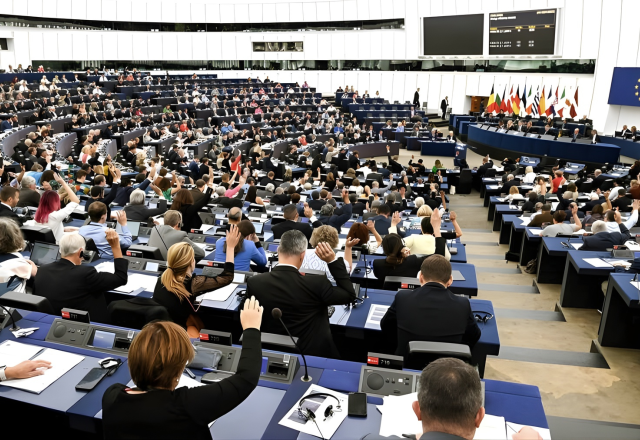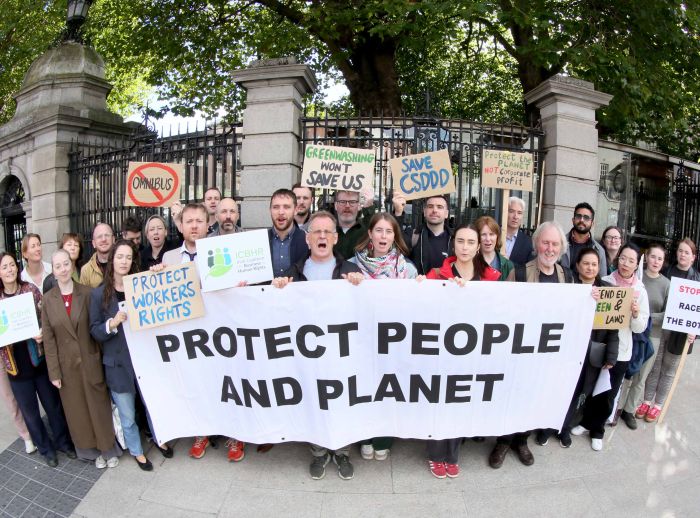
That they took this unprecedented step in order to slash environmental and human rights protections, remove critical climate transition obligations, and expose workers and communities to corporate harms is unconscionable.
- 4 min read
- Published: 14th November 2025
European Parliament votes to slash climate and human rights protections in deregulation vote
Fine Gael MEPs side with the far right in crucial European Parliament vote, according to the Irish Coalition for Business and Human Rights.
The Irish Coalition for Business and Human Rights (ICBHR) condemns today’s European Parliament vote on the Corporate Sustainability Due Diligence Directive (CSDDD) and Irish Fine Gael MEPs siding with the far-right to further reduce protections for workers, communities and the environment affected by corporate abuse.
The vote undermines provisions that would allow workers and communities to access justice, meaning that EU-based companies that abuse people and the planet are unlikely to face any sanctions.
Yesterday’s vote is part of sweeping deregulation of EU sustainability laws, weakening protections under the Corporate Sustainability Due Diligence Directive (CSDDD) and the Corporate Sustainability Reporting Directive (CSRD), including deleting the obligation for big companies to bring their emissions in line with the Paris Agreement.

The vote also removed thousands of companies from the scope of EU due-diligence rules, leaving many more workers and communities exposed to human rights abuses and environmental harm. The possibility of claiming damages under the law is to be abolished. In future, thousands of large companies will not have to comply with any rules in their supply chains. The victims are the workers on plantations and in textile factories who will pay the price.
Despite past claims to be a voice of reason in Europe, Fine Gael MEPs voted with the European People’s Party (EPP) and far-right groups, breaching a commitment not to cross a ‘red line’ to cooperate with extremist parties and aligning with anti-democratic forces to undermine human rights and environmental standards in the name of corporate profits.
The outcome of yesterday’s vote runs counter to public opinion. Recent opinion polls undertaken by Ipsos in 10 European countries revealed that a large majority of EU citizens favour strong human rights and environmental protections and believe that wealthy companies should be legally obliged to reduce their greenhouse gas emissions.
"The fact that Fine Gael MEPs have so openly sided with the far right is a blatant breach of the red line that mainstream parties promised to uphold and represents a fundamental shift in democracy in Europe. That they took this unprecedented step in order to slash environmental and human rights protections, remove critical climate transition obligations, and expose workers and communities to corporate harms is unconscionable."— Evie Clarke, Coordinator of the ICBHR.
“By aligning with the far right to push a corporate-driven agenda, the EPP has crossed a dangerous line. This isn’t just another policy setback, it’s a betrayal of Europe’s social and environmental commitments. When anti-EU parties and corporate lobbies write the rules, accountability dies and Europe’s credibility crumbles.”— Nele Meyer, Director of the European Coalition for Corporate Justice (ECCJ).
The European Parliament, Council of Ministers, and Commission must now work to salvage crucial provisions of the CSDDD in order to make it in any way meaningful for affected and potentially affected workers and communities during the trilogue process.
ENDS
Evie Clarke, Irish Coalition for Business and Human Rights
eclarke@christian-aid.org
+353 857859503
Kate Brayden, Oxfam Ireland
kate.brayden@oxfam.org
+353 87 749 7447
• The Irish Coalition for Business and Human Rights is a coalition of over 20 members including human rights, international development and environmental organisations, trade unions and academic experts, working collaboratively to progress corporate accountability, based on respect for human rights and the environment. Members include: Action Aid, Centre for Business and Society of University College Dublin, Christian Aid Ireland, Comhlámh, DCU Business School, Fairtrade Ireland, Friends of the Earth Ireland, Front Line Defenders, Africa Europe Faith and Justice Network Ireland, Global Legal Action Network, Irish Congress of Trade Unions, Irish Council for Civil Liberties, Latin American Solidarity Centre, National Women’s Council of Ireland, Oxfam Ireland, Proudly Made in Africa, Trinity College Dublin Centre for Social Innovation, and Trócaire.
• The Corporate Sustainability Due Diligence Directive (CSDDD) was meant to protect people and the planet from corporate harms such as the 2013 Rana Plaza Disaster in Bangladesh. Passed in 2024, the Directive sets out a set of regionwide standards and binding obligations for large EU-based companies to try to prevent human rights and environmental abuses and encourage more responsible business conduct. It also provided for a harmonised regime of civil liability that would make it easier for workers and affected communities to access remedy. But before the Directive even came into force it was subjected to an ‘omnibus’ legislative package that seeks to remove or water down many of these key provisions. While many in the EU and Irish government have presented this process as “simplification”, President Ursula Von Der Leyen has herself referred to it as “deregulation”.
